Top AI-Powered Knowledge Base Software for 2025
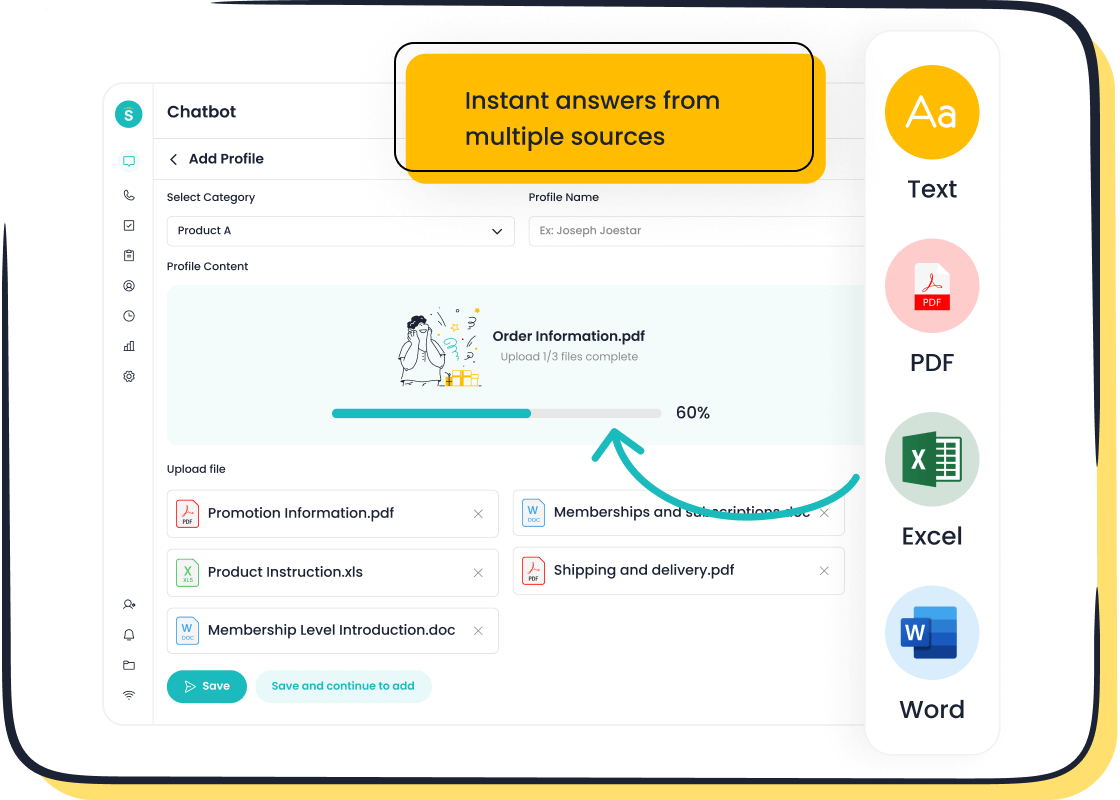
AI-powered knowledge base software has transformed how you interact with businesses. It simplifies customer support by automating responses, improving efficiency, and enhancing your overall experience. The adoption of AI has grown faster than the internet and PCs, proving its value as a general-purpose technology. By 2027, the market for generative AI is expected to reach $407 billion, showcasing its rapid expansion. Businesses now rely on AI to deliver seamless customer experiences, reduce operational costs, and optimize workflows. Tools like Sobot exemplify the best AI knowledge base software, helping companies meet your needs with precision and speed.
Best AI Knowledge Base Software for 2025

Zendesk: A user-friendly platform for customer experience teams.
Zendesk stands out as one of the best ai knowledge base software options for customer experience teams. Its intuitive interface simplifies managing customer interactions, making it a favorite among businesses. Zendesk provides tools to collect feedback after every interaction, helping you measure customer satisfaction and identify areas for improvement.
You can track key metrics like response times, ticket volumes, and SLA adherence. These insights allow you to allocate resources effectively and ensure compliance with service commitments. Zendesk’s ability to streamline workflows and enhance customer satisfaction makes it a top choice for businesses aiming to deliver exceptional service.
- Key Features:
- Real-time tracking of ticket resolution times.
- Tools for monitoring customer satisfaction (CSAT) scores.
- Comprehensive dashboards for analyzing trends and performance.
Brainfish: Transforming knowledge bases into intelligent assistants.
Brainfish redefines how you use knowledge base software by turning it into an intelligent assistant. This platform leverages ai tools like natural language processing (NLP) and machine learning (ML) to provide accurate and context-aware responses. It excels in processing human language, making it easier for customers to find answers without human intervention.
With Brainfish, you can automate repetitive tasks and focus on more complex customer needs. Its predictive analytics feature helps anticipate customer queries, ensuring faster resolutions. Businesses benefit from reduced operational costs and improved efficiency, making Brainfish a valuable addition to their customer support strategy.
- Why Choose Brainfish?
- NLP dominates the market with a 38.3% revenue share by 2025.
- Machine learning enhances automation and predictive capabilities.
Document360: Optimized for creating and managing self-service knowledge bases.
Document360 is a leading choice for businesses prioritizing self-service. It allows you to create and manage a robust knowledge base that empowers customers to find answers independently. Research shows that 67% of customers prefer self-service over traditional support, and 51% favor technical support through a knowledge base.
This platform offers a user-friendly interface for organizing articles, FAQs, and guides. It also provides analytics to track customer interactions, helping you refine your content for better engagement. Document360’s focus on self-service not only improves customer satisfaction but also reduces the workload on support teams.
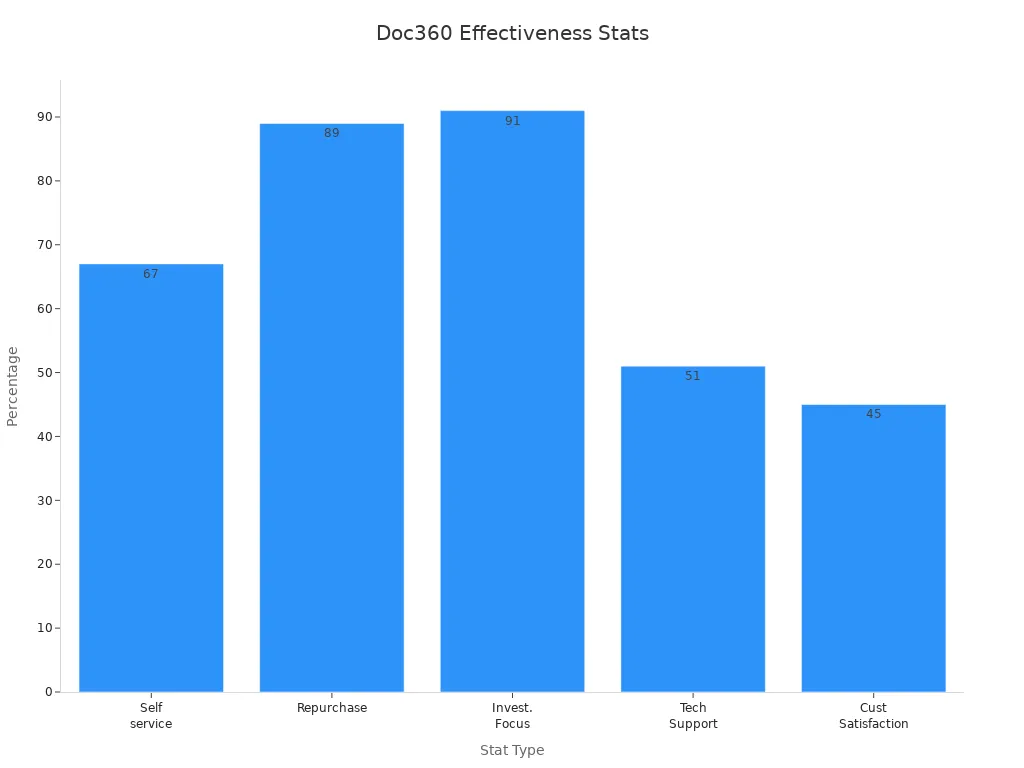
- Key Statistics: | Statistic | Description | |-----------|-------------| | 89% | Consumers are more likely to repurchase after positive service experiences. | | 45% | Average increase in customer satisfaction after adopting self-service. |
Document360’s ability to enhance customer satisfaction and streamline support processes makes it one of the best knowledge base software options for 2025.
Helpjuice: Simplifies content creation and knowledge sharing.
Helpjuice is a powerful tool designed to make content creation and knowledge sharing effortless. It provides an intuitive platform that allows you to create, organize, and share knowledge base articles with ease. This software is ideal for businesses aiming to streamline their internal and external communication processes.
Helpjuice’s impact is evident in its performance benchmarks. Businesses using this platform have reported a 200% increase in total visits, a 150% growth in unique visitors, and a 180% rise in page views. These metrics highlight its ability to enhance content discovery and engagement. Additionally, users spend 75% more time on pages, reflecting deeper interaction with the knowledge base.
Tip: A well-structured knowledge base not only improves customer satisfaction but also reduces the workload on your support teams.
Helpjuice’s simplicity and effectiveness make it a top choice for businesses looking to improve their knowledge management. By enabling you to focus on creating valuable content rather than managing complex systems, it ensures your team can work more efficiently while delivering a better experience for your customers.

Sobot Chatbot: AI-powered, multilingual, and ChatGPT-enabled for 24/7 customer support.
The Sobot Chatbot stands out as a cutting-edge solution for automating customer interactions. It combines advanced AI tools, multilingual capabilities, and ChatGPT integration to deliver seamless customer support around the clock. This chatbot is designed to handle routine queries, allowing your team to focus on more complex tasks.
| Feature | Description |
|---|---|
| Multilingual | Supports multiple languages for diverse customer bases. |
| ChatGPT Enabled | Utilizes ChatGPT for enhanced conversational abilities. |
| 24/7 Availability | Provides round-the-clock customer support. |
| Personalized Interactions | Automates responses tailored to individual customer needs. |
| Efficiency Boost | Increases team efficiency through automation. |
The Sobot Chatbot offers several advantages. It provides faster and more personalized customer experiences, reduces response times, and lowers support costs. By automating routine queries, it enhances overall efficiency and ensures your customers receive timely assistance.
For example, OPPO, a global leader in smart devices, achieved an 83% chatbot resolution rate and a 94% positive feedback rate after implementing Sobot’s solutions. These results demonstrate the chatbot’s ability to improve customer satisfaction and operational efficiency.
The Sobot Chatbot’s AI tools, combined with its user-friendly design, make it an essential asset for businesses aiming to optimize their customer support processes. Its ability to operate 24/7 ensures your customers always have access to the help they need, no matter the time or location.
Features and Benefits of Knowledge Base Software
Key Features to Look For
When choosing knowledge base software, you should focus on features that enhance usability and efficiency. AI-driven content suggestions stand out as they help users find relevant information quickly. Personalized user experiences are another essential feature, tailoring content to individual needs based on past interactions. This ensures every user feels valued.
Search functionality is a must-have. It allows users to retrieve information instantly, saving time and improving satisfaction. Advanced analytics and insights also play a crucial role. They provide data on user behavior, helping you refine your content strategy. Multilingual support broadens your reach, making your self-service help center accessible to a global audience.
Other valuable features include customizable templates for branding, interactive guides for step-by-step assistance, and feedback collection to improve content quality. Sobot’s AI-powered chatbot, for instance, excels in these areas by offering multilingual support and seamless integration with various platforms, ensuring a superior customer experience.
Benefits for Customer Support Teams
Knowledge base software significantly reduces the workload for your support teams. By automating routine tasks, it frees up resources for more complex issues. AI tools optimize knowledge application processes, allowing your team to focus on strategic activities. For example, Sobot’s chatbot automates query resolution, improving productivity by 70%.
Enhanced knowledge sharing among team members is another benefit. AI-driven platforms provide real-time support, ensuring everyone has access to the information they need. This improves decision-making and fosters collaboration. Additionally, analytics and reporting tools offer insights into team performance, helping you identify areas for improvement.
Statistics show that 90% of customer experience management leaders plan to invest in self-service tools. This highlights the growing importance of these platforms in streamlining operations and enhancing efficiency.
Benefits for Customers
For customers, knowledge base software offers faster and more convenient access to information. Studies reveal that 22% of users find self-service options quicker than traditional support channels. This speed improves satisfaction and builds trust in your brand.
AI-powered platforms like Sobot’s chatbot provide personalized interactions, tailoring responses to individual needs. This creates a more engaging experience and fosters loyalty. Multilingual support ensures that customers from diverse backgrounds can access your self-service help center effortlessly.
Moreover, features like voice search and interactive guides make it easier for users to navigate your knowledge base. These tools not only enhance the customer experience but also encourage repeat business. For instance, OPPO achieved a 57% increase in repurchase rates after implementing Sobot’s solutions, showcasing the tangible benefits of AI-driven knowledge base software.
How to Choose the Best Knowledge Base Software
Assessing Your Business Needs
Choosing the right knowledge base software starts with understanding your business requirements. Begin by identifying the challenges your team faces in managing customer support and self-service options. For example, if your team struggles with repetitive queries, you might need AI-powered tools to automate responses. Similarly, if your customers prefer finding answers independently, prioritize software with robust self-service capabilities.
To assess your needs effectively, follow these steps:
- Define your goals: Determine whether you aim to improve response times, enhance customer satisfaction, or reduce operational costs.
- Analyze your current tools: Evaluate your existing systems and identify gaps in functionality.
- Gather data: Use metrics like ticket resolution times and customer feedback to pinpoint areas for improvement.
- Consult your team: Involve your support staff to understand their pain points and feature preferences.
By aligning your software choice with your business goals, you ensure a solution that meets both your team's and your customers' needs.
Comparing Features and Pricing
Not all knowledge base software offers the same features or pricing models. To make an informed decision, compare options based on their functionalities and costs. Look for software that includes AI-powered search, customization options, and analytics tools. These features enhance usability and help you track performance.
Here’s a breakdown of common pricing models:
| Pricing Model | Description |
|---|---|
| Per user pricing | Charges a fee for each user account |
| Flat monthly/annual fee | Single all-access price regardless of users |
| Pay per use | Usage-based pricing rather than fixed subscriptions |
| Implementation costs | Fees for integrating, migrating data, and custom configurations |
| Support fees | Pricing for premium or dedicated technical support plans |
| Training costs | Charges for getting employees up to speed on using the software |
When comparing pricing, consider hidden costs like training or implementation fees. Also, check for discounts on annual subscriptions or bundled packages. This approach ensures you get the best value for your investment.
Evaluating Scalability and Integration Options
Your knowledge base software should grow with your business. Scalability ensures the platform can handle increased users, data, and complexity as your company expands. For instance, software with robust content organization tools and advanced analytics can support larger teams and more extensive knowledge bases.
Integration capabilities are equally important. Ensure the software connects seamlessly with your existing tools, such as CRM systems or collaboration platforms. This integration streamlines workflows and improves efficiency. For example, platforms that support omnichannel solutions allow you to manage customer interactions across multiple channels from a single interface.
When evaluating scalability and integration, consider the complexity of your current projects and future growth plans. Look for case studies or benchmarks that demonstrate the software’s ability to handle large-scale operations. This ensures your investment remains valuable as your business evolves.
Trends in AI-Powered Knowledge Base Software for 2025
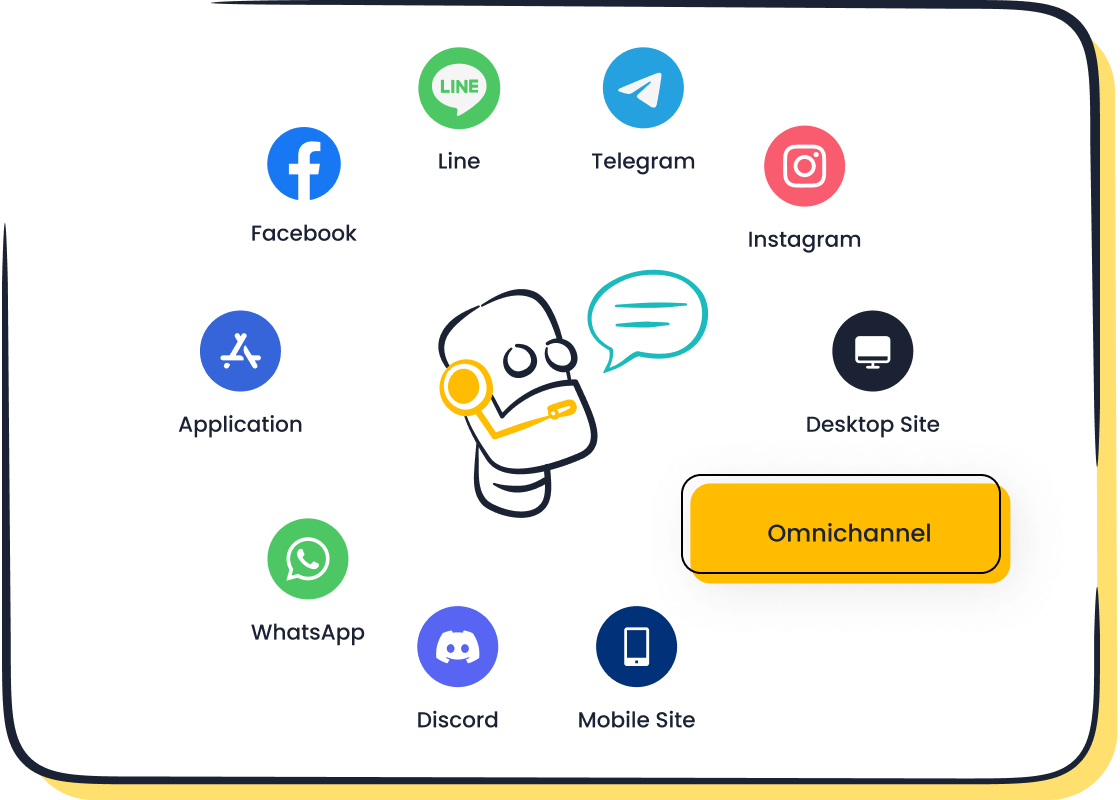
Increased Personalization Through AI
Personalization has become a cornerstone of customer engagement. By 2025, AI will play a pivotal role in delivering tailored experiences through knowledge base software. Customers increasingly expect interactions that feel unique to their needs. Research shows that 91% of consumers are more likely to engage with brands that personalize their experiences, while 71% feel frustrated when personalization is absent. This trend highlights the importance of AI tools that can analyze user behavior and provide contextually relevant information.
AI-powered platforms like Sobot’s chatbot excel in this area. They use advanced algorithms to understand customer intent and deliver personalized responses. For example, Sobot’s chatbot can identify user preferences through past interactions and offer tailored solutions, enhancing satisfaction and loyalty. This level of personalization not only improves the customer experience but also drives revenue growth, as businesses focusing on customer experience see three times the revenue growth compared to their peers.
Enhanced Natural Language Processing (NLP)
Natural Language Processing (NLP) continues to revolutionize how knowledge base software interacts with users. Early rule-based systems have evolved into sophisticated deep learning models like GPT, enabling AI to understand grammatical, contextual, and semantic nuances. These advancements allow chatbots and virtual assistants to provide more accurate and human-like responses.
For instance, Sobot’s AI chatbot leverages NLP to process complex queries and deliver precise answers. It can handle multilingual interactions seamlessly, making it ideal for businesses with diverse customer bases. Enhanced NLP capabilities also improve applications like sentiment analysis and real-time language translation, ensuring users receive the support they need without delays. By 2025, these advancements will make AI-driven knowledge base software indispensable for delivering efficient and meaningful customer interactions.
| Advancement Type | Description |
|---|---|
| Rule-based systems | Early systems using hand-coded rules, limited by language complexity. |
| Deep learning | Revolutionized NLP with large neural networks, leading to breakthroughs in various applications. |
| Pretrained language models | Models like GPT allow fine-tuning for specific tasks, achieving state-of-the-art performance. |
Integration with Omnichannel Support
The integration of knowledge base software with omnichannel support systems is transforming customer service. Businesses can now provide seamless experiences across multiple platforms, from social media to email. This approach ensures customers can access information through their preferred channels, enhancing satisfaction and loyalty.
Sobot’s omnichannel solution exemplifies this trend. It consolidates customer interactions into a unified workspace, allowing agents to deliver consistent and efficient support. Features like AI-driven automation and real-time analytics further enhance the experience by reducing response times and improving accuracy. For example, OPPO achieved an 83% chatbot resolution rate and a 94% positive feedback rate after integrating Sobot’s solutions. These results demonstrate the effectiveness of combining knowledge base software with omnichannel systems to meet evolving customer expectations.
Tip: A well-structured omnichannel strategy not only improves customer satisfaction but also reduces operational costs by streamlining workflows.
Benefits of Using AI-Powered Knowledge Base Software
Faster Response Times
AI-powered knowledge base software significantly reduces response times, ensuring customers receive help when they need it most. These tools automate repetitive tasks like answering FAQs and assigning tickets, allowing your team to focus on complex issues. For example, AI-driven platforms provide agents with instant access to accurate information, cutting down the time spent searching for answers. Predictive response optimization further enhances efficiency by anticipating customer needs based on historical data.
| Metric | Improvement Percentage |
|---|---|
| Reduction in average response time | 40% |
| Increase in first-contact resolution | 65% |
| Decrease in support tickets | 25% |
| Customer satisfaction rating | 92% |
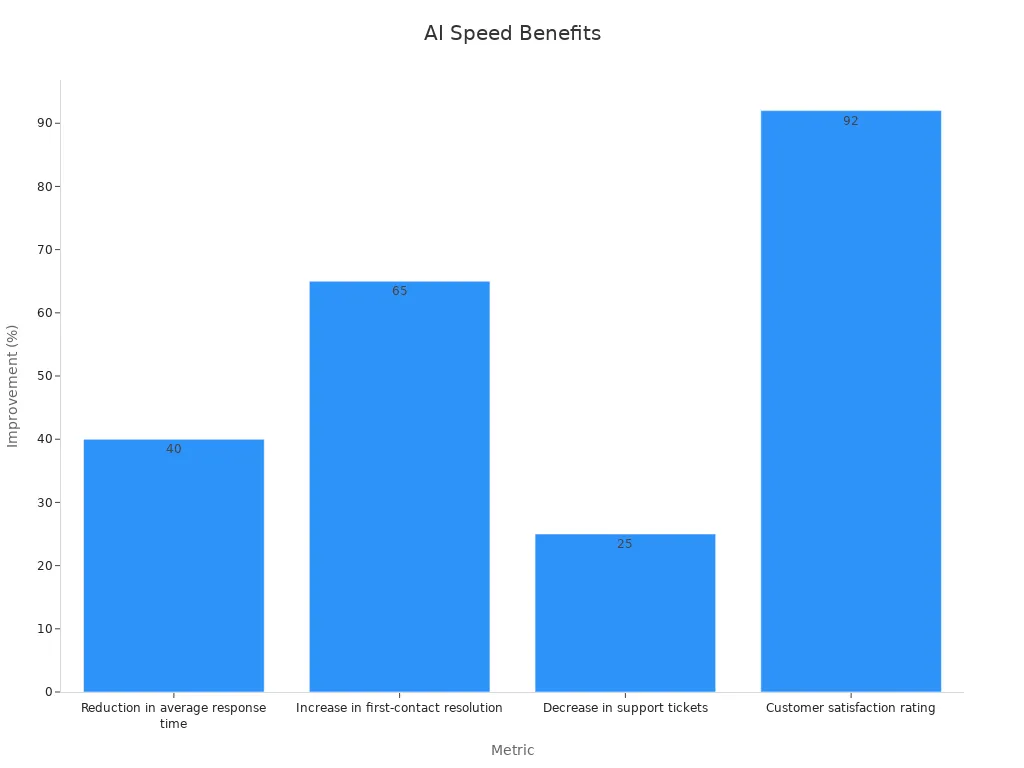
AI tools also improve operational performance by predicting call volumes, helping you allocate resources effectively during peak times. This ensures faster resolutions and a better customer experience across all channels.
Improved Self-Service Options
Self-service options empower customers to find answers independently, enhancing their overall experience. Research shows that 61% of customers prefer self-service for simple issues, while 81% want brands to offer these options. AI-powered knowledge bases make this possible by providing intuitive search functions, interactive guides, and multilingual support.
| Statistic | Percentage | Source |
|---|---|---|
| Customers who prefer self-service for simple issues | 61% | Salesforce |
| Customers who view companies more positively if they offer self-service | 77% | HigherLogic |
| Customers who want self-service options in brands they interact with | 81% | NICE |
| High performers in service companies offering self-service options | 80% | Salesforce |
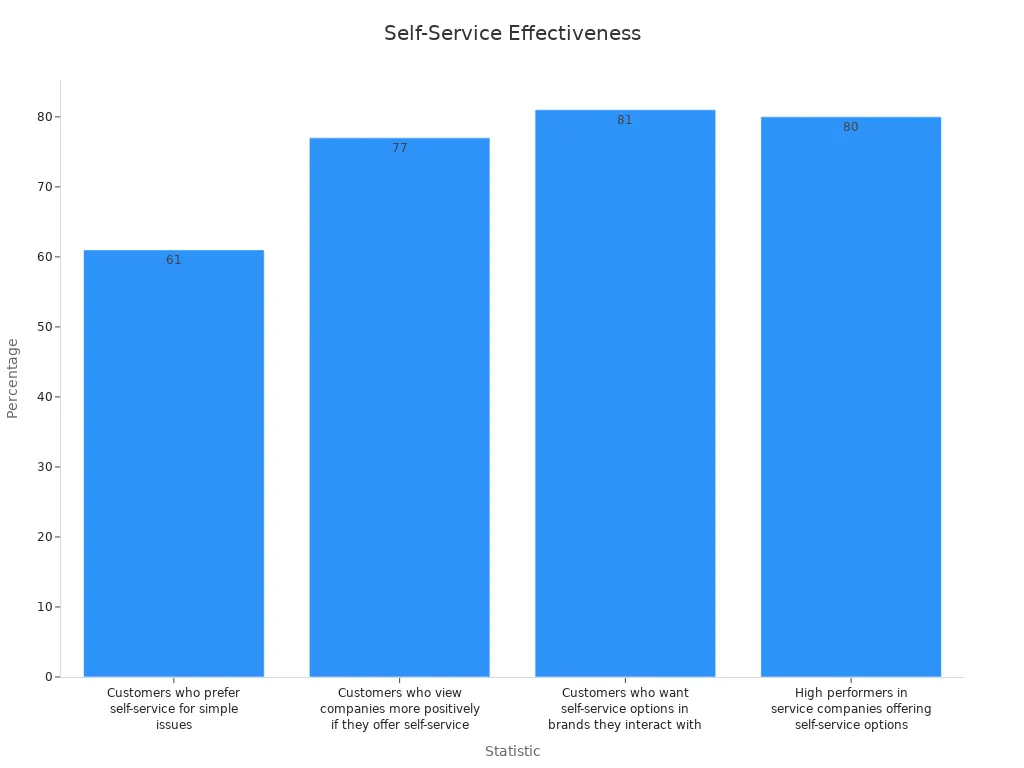
These tools also provide valuable insights into customer behavior. By analyzing which documents are most accessed, you can refine your content to address common pain points. This not only improves customer satisfaction but also builds trust in your brand.
Reduced Workload for Support Teams
AI-powered knowledge base software lightens the workload for your support teams by automating repetitive tasks. Companies using AI report a 30% reduction in manual workload, allowing agents to focus on more strategic activities. For instance, AI tools handle tasks like invoice checking and data entry, freeing up time for your team to address complex customer needs.
Additionally, a 25% increase in self-service usage reduces the reliance on support staff. This shift improves efficiency and ensures your team can manage their workload effectively. Businesses also benefit from a 45% increase in actionable insights, which helps refine support strategies and improve overall performance.
By integrating AI into your customer support processes, you create a more efficient and productive environment. This not only enhances the customer experience but also ensures your team operates at its best.
AI-powered knowledge base software has revolutionized how businesses manage customer interactions. These tools enhance productivity, streamline workflows, and improve your overall experience. Platforms like Sobot Chatbot, Zendesk, and Brainfish demonstrate how AI can transform customer support by automating tasks and delivering personalized solutions. The global AI market's rapid growth highlights the increasing importance of these technologies in business operations.
Choosing the right software ensures you provide faster, more efficient support while reducing costs. Explore the tools mentioned in this article to find the one that aligns with your needs. Sobot Chatbot, with its advanced features, offers a seamless experience for both your team and customers.
FAQ
What is AI-powered knowledge base software?
AI-powered knowledge base software uses artificial intelligence to manage and deliver information. It helps you find answers quickly by automating search, providing personalized suggestions, and analyzing user behavior. These tools improve efficiency and enhance customer experiences by offering accurate, context-aware responses.
How does AI improve customer support?
AI automates repetitive tasks like answering FAQs and routing tickets. It provides instant responses, reducing wait times. AI tools also analyze customer data to deliver personalized solutions. This improves satisfaction and allows your support team to focus on complex issues.
Can AI-powered tools handle multiple languages?
Yes, many AI-powered tools, like Sobot Chatbot, support multiple languages. This feature ensures you can serve a diverse customer base effectively. Multilingual capabilities allow customers to interact in their preferred language, improving accessibility and satisfaction.
What industries benefit from AI knowledge base software?
Industries like retail, finance, gaming, and education benefit from AI knowledge base software. These tools streamline customer interactions, reduce costs, and improve satisfaction. For example, retail businesses use AI to provide self-service options, while financial services rely on it for secure, efficient support.
Is coding required to set up AI-powered tools?
No, most AI-powered tools, including Sobot Chatbot, do not require coding. They feature user-friendly interfaces with drag-and-drop or point-and-click options. This makes it easy for you to design workflows and deploy solutions without technical expertise.
See Also
Best 10 AI Solutions for Corporate Call Centers
Comprehensive Overview of AI Software for Call Centers
Enhancing Efficiency with AI in Customer Service